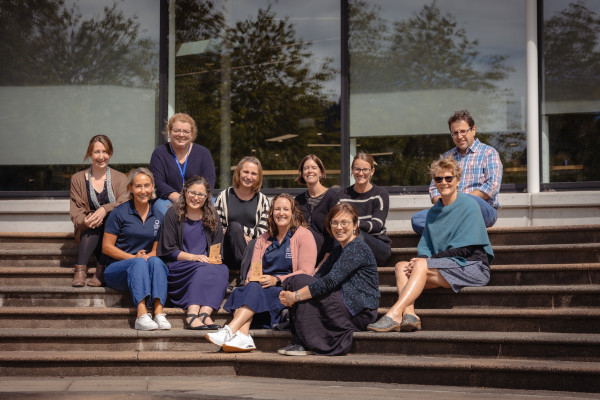- Tūhono home Hoki ki Tūhono
-
- Staff Directory
- Chief Executive Office Auckland International Office Corporate Services Finance Campus Services Functions and Catering Information Systems and Support Marketing, Communications and Engagement Learner Journey Academic Registry International Learner Services Te Punaka Ōwheo
- Learner Experience Academic Excellence Central Campus College of Community Development and Personal Wellbeing College of Engineering, Construction and Living Sciences College of Health College of Work Based Learning Open Education Resource/OERu Research and Postgraduate Studies Te Maru Pumanawa | College of Creative Practice and Enterprise
- Māori Development and Kaitohutohu Office People, Culture & Safety People and Culture Childcare Centre Te Ama Ako | Learning and Teaching Development Wellbeing and Safety Auckland Staff Directory Executive Office Academic Corporate Services Marketing and Business Development Human Resources Campus Quality and Programme Development
-
 Our people make a better world
Our people make a better world
We build the capabilities of individuals, organisations and communities and help them to realise their potential.
Staff Directory
-
- Tools
- Academic Integrity Declaration Form AIC applications dashboard Approved programmes Approved programme fees Centralised assessement repository Chemwatch Course evaluation and surveys CRM applications CRM customer service hub Delegations policy/process Disability and neurodiversity Dynamics 365 (CRM) EBS Ontrack EBS Report Email security personal portal Employment Matters / Solarworkplace / Performance reviews eTaxi eTV
- Financial variance reporting Hidden Disabilities Sunflower programme FCM travel intranet InPlace International entry requirements Knowledgebase articles Learner support dashboards Linkedin Learning Log a job with Marketing Login as an applicant Media consent form Microsoft 365 Moderation App Moodle OP Docs OP Docs - Publishing OP Image Libraries Performance Excellence Portal Product Evaluation Panel
- Policy Library Privacy Programme and course design/development Qualtrics XM RDS Remote access support portal Research Database Robertson Library Staff FAQs about graduation Status of Programmes Student intranet (Kāpehu) Study Abroad info for learners Taha Talks (videos for students) Tūhauora I Wellbeing resources Uniprint Vault Webexpenses Auckland tools
-
 Vault
Had an accident or near miss?
Log it here
Vault
Had an accident or near miss?
Log it here
-
- Communities
- Community AI Steering Committee Ally Network EBS Community of Interest EdTech Champions Health & Wellbeing Research Internal Evaluation Neurodiversity Professional Team Professoriate Proud@OP Student Support Website Advisory Group Web Champions Working under the Rainbow Project Learner Capability Trade Training Centre
- Committee Academic Committee Animals@OP Diversity and Equity Doctor of Professional Practice Committee Kaunihera Whakahaere - Leadership Council Internal Evaluation Learning & Teaching Leadership Team Library Committee Mental Health and Wellbeing Advisory Group Otago Polytechnic Board of Directors Pastoral Care Code Committee Programme Approvals Committee Research and Postgraduate Committee Research Ethics Committee Staff Subcommittee
- Think Tanks Mātauraka Our learners achieve educational success Pūtea Our financial success Tākata Our people, our team, our community Tiriti Our active commitment as a Treaty partner Tūroa Our commitment to be a sustainable and responsive organisation
-
 Create a community
Create a community
Do you have a community, committee or project that you'd like represented here?
Communities
-
- About OP
- Keep up to date All news All events All notices All blogs Share your info Create a news article Create an event Create a notice Create a blog
- Community and Partnerships Alumni and friends Education Foundation Operational information Academic calendar 2025 Academic calendar 2026 Current vacancies Dunedin campus map Our policies Topical FAQs
- Who we are About OP Commemorative sites Māori Strategic Framework OP merchandise Our history Our strategic priorities Pasifika Strategic Framework (2025-2030) Vision and Values Working for us OP job opportunities Wellbeing Calendar Working at OP
-
New Zealand: 0800 762 786
contact us
International: +64 3 477 3014
Embodied creativity: Creative play as a catalyst for adult learning, spirituality and a ludic (playful) mindset
Author: Helen Wilderspin
Supervisors: Margy-Jean Malcolm Bronwyn Hegarty
Embodied creativity: Creative play as a catalyst for adult learning, spirituality and a ludic (playful) mindset
Helen Wilderspin
3 February 2023
Wilderspin, H. (2022). Embodied creativity: Creative play as a catalyst for adult learning, spirituality and a ludic (playful) mindset. (Document submitted in fulfilment of the requirements for the degree of Doctor of Professional Practice). Otago Polytechnic, New Zealand. https://doi.org/10.34074/thes.5880
Abstract
In my research, I explored and investigated the potential of creative play to enrich adult learning, creativity, spirituality, liturgical worship, and ministry formation, in an Anglican theological college setting (2020–2021).
In my experience as an Anglican priest in a parish, and a student in a theological college, I have discovered that the church and theological institutions do not always offer a creative way for adults to learn about or engage with the sacred. Although there is growing evidence that creativity and play can have positive benefits for adult learning, there is less research regarding the effect of creative play on adult spirituality and theological education.
I used a crystallisation qualitative framework (as described by Ellingson, 2009, 2014) and phenomenological methodology to provide a trans-disciplinary perspective and hold in tension a bricolage of relationships, data-collection methods, and artefacts to engage and ‘play’ with my research. Through my experience-based learning, autoethnographic critical reflection, cycles of action research, poetic inquiry, and a rich and complex range of qualitative data sources I investigated the impact of creative play initiatives at the theological college.
During three parts of the project, I used creative play strategies to stimulate the imagination and evoke a ludic (playful) mindset. In Part 1, I developed eight creative liturgical services for the college students to enrich their sense of the holy/ divine/sacred. In Part 2, I facilitated a series of three workshops (online and face-to-face) to understand the impact of creative play on the students’ own learning, imagination, sense of fun, and creativity. In Part 3, I worked with a group at the theological college over six months to explore the role of creative play in terms of group dynamics and liturgical worship as we planned and led a number of worship services.
My facilitation of the group led to the discovery of six conditions that were helpful in my practice and context for encouraging a team culture of creativity and an enhanced sense of the holy/divine/sacred to develop. These conditions are:
1. a ludic mindset,
2. a facilitator/guide/role model,
3. the creation of a team culture of creativity,
4. shared learning experiences designed to stimulate imagination,
5. a variety of locations for creative play activities,
6. a reflection/action process.
Through the development of these conditions, I encouraged three main ludic qualities (curiosity, embodied creative expression, and relationality), in myself as a priest and in participants. My research revealed the importance of not only a ludic mindset but also an embodied creativity that has a collaborative aspect. Therefore, based on the work of Kaufman and Beghetto (2009) and their 4-C model of creativity (Big-C, Pro-C, mini-c, little-c), I suggest a fifth dimension, collaborative-c, be added, to bring a more embodied, collective, and culturally inclusive dimension to this model.
The research provides an evidence-based study of how creative play methods can be woven into theological formation and training, support participants’ confidence and creativity in their ministry and help adults encounter the sacred in their everyday lives through creativity and playfulness.
Keywords: creative play, theological education, adult learning, experiential learning, qualitative research, spirituality
Helen's research was supervised by Margy-Jean Malcolm and Bronwyn Hegarty.
Licence
A copy of the thesis is publicly available under a Creative Commons Attribution Non-Commercial No Derivatives licence CC BY-NC-ND 4.0 International
![]()